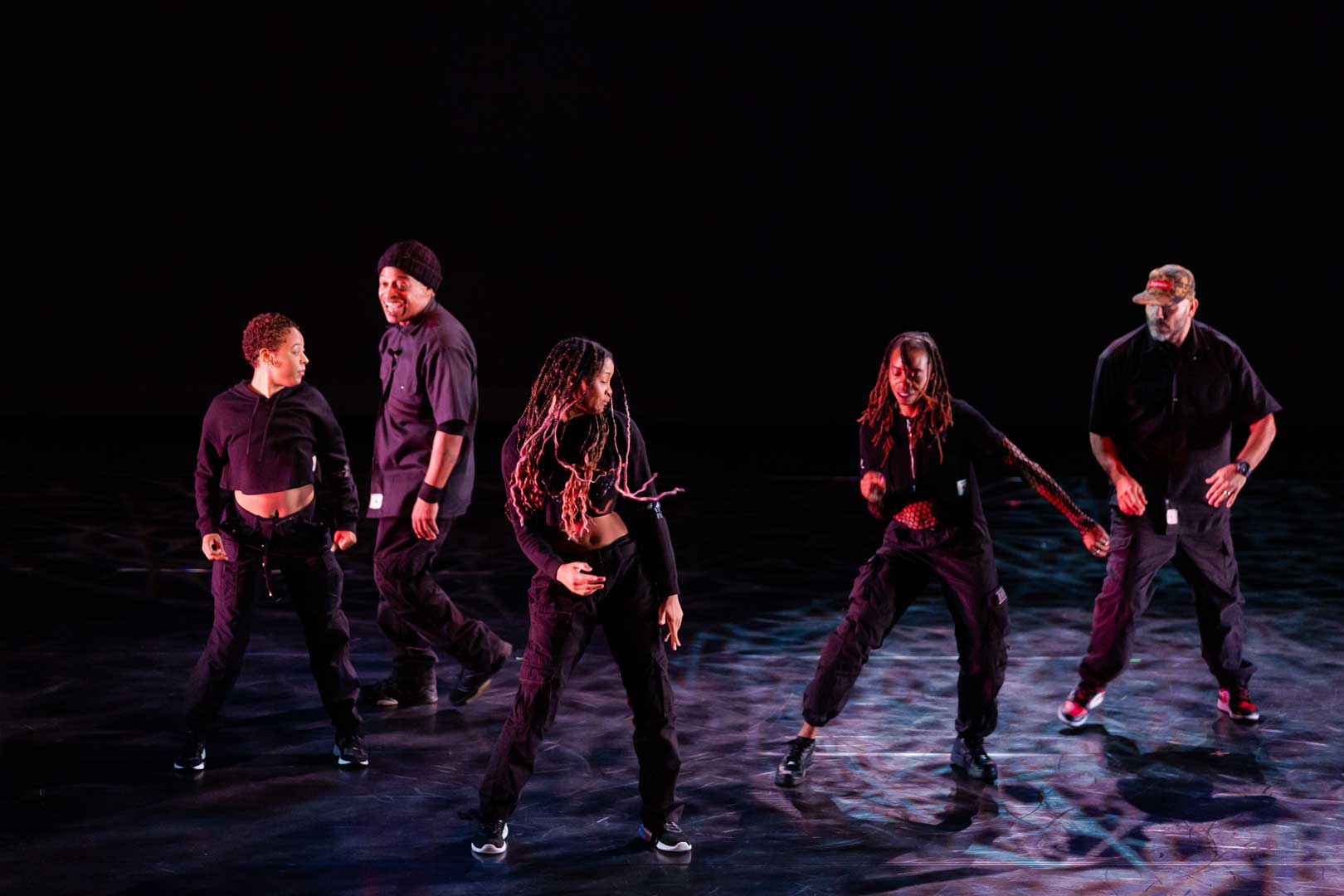
This performance reminded me of a time when what I most desired, like Jewels, was out of sight and out of reach.
In response to Rome & Jewels
In response to Rome & Jewels
The coffee table I had ordered online was still in the box; I was using the box as the table. As his gaze swept through the apartment, a chilling sense of vulnerability engulfed me; I felt completely exposed.
The only furniture in the living room was a navy blue sectional couch, adorned with a line of pillows—their pattern so ubiquitous that they could easily blend into the impersonal carpet of a hotel ballroom.
Bare white walls, against which sealed beige cardboard boxes rested, created the ambiance of a life on pause. These boxes, my entire life, packed and shipped from Cincinnati months ago, remained unopened, like refugees uncertain of their place in a new reality.
With my new job going as poorly as it was, I wasn’t sure I’d be staying in Nashville much longer. So, what was the point of unpacking?
For the first time, the disarray in my life was in sharp focus, and the man before me—someone I was just getting to know—had become the sole witness.
After we shared the simple dinner I had prepared, he broke the restful silence.
“I’ve lived in many places in my lifetime,” he began. “The most valuable lesson I’ve learned is to make a home wherever I am. Even if you’re only going to be here for one more week, hang your clothes in the closet, put your socks in the drawers, and set your utensils in the kitchen cabinets. Make this place a home that offers comfort after a rough day.”
I wasn’t immediately convinced by his advice. I wanted an actual home—not a pretend one, forced by the unfair curveball life was throwing at me.
I moved to Nashville after graduate school to join a promising healthcare startup. I was elated because the director of my new team promised to sponsor my work visa—an invaluable assurance for an immigrant hoping to build a life in the U.S. It felt like the puzzle pieces of my destiny were falling into place seamlessly.
I didn’t know anyone in Nashville, so the move felt like an adventure. A few weeks after my arrival, I signed up on a dating app called Coffee Meets Bagel, which matched me with a new dating prospect every day.
In no time, I was on my first date with Matt, an immigrant from Hungary who was ten years older. He was tall, with broad shoulders and strong arms that made me feel very small next to him. His deep voice and heavy accent surprised me as he extended his hand to greet me rather formally when we met for coffee. He sounded like the bad guy from the movie Taken—and I found it very attractive!
“You don’t sound like a ‘Matt’,” I quipped, aware of how immigrants sometimes adopt more common English names to assimilate.
“Maciej,” he responded, smiling. “That’s what my mother calls me.”
From that moment on, I called him by his real name.
We instantly bonded over our experiences as immigrants. He spoke several languages and had lived in even more countries in Europe and Asia before moving to the U.S.
Our conversation spanned from our favorite cuisine to global politics, flowing like a quiet river in an open plain, meandering, then breaking off into smaller streams that eventually found their way back to each other downstream.
He was calm and confident, exuding an aura so magnetic that I felt electricity coursing through me whenever he leaned a little closer to catch an errant word in the noisy little cafe.
His naturally stern face captured his intensity quite accurately: he was slow to laugh and thoughtful about any opinions he let escape his lips, lest he find he had no facts to support them.
He was curious about my perspectives as a Black immigrant, convinced that all immigrants in America faced the same challenges but open to changing his position when I proposed that race potentially made some immigrant experiences more challenging than others.
We lost ourselves in conversation, before I realized I was late for an appointment three hours later.
Shortly after we met, my work life began to unravel.
By my two-month anniversary, the director had decided that I was the weak link of the team and wanted me out.
She demanded an hourly accounting of my work, which made me feel intensely scrutinized and self-conscious, like an ant under a magnifying glass.
This scrutiny made me so anxious that I fumbled my words and forgot simple answers during team meetings. Over time, my tasks were gradually transferred to others, leading to my eventual exclusion from important team meetings.
If I were American, I probably would have quit. However, my immigration status depended on my employment. If I lost my job, I had a maximum of three months to find another job specific to my field of study, or else I was required to leave the US within sixty days.
I moved to Nashville based on a verbal promise from my director to file for my visa before my temporary student work permit expired. Confident in this arrangement, I invested all my savings in the move, despite receiving a minimal relocation package.
Consequently, I was in so much debt that I didn’t have enough money for a plane ticket back to Kenya if I had to leave.
My anxiety worsened every day: I couldn’t sleep or eat, losing twelve pounds in two weeks. I couldn’t focus on anything, not even sitting still long enough to watch my favorite TV shows.
Soon, I started having trouble getting out of bed, and when I did, it was only to try and put in some extra hours of work in an attempt to make my boss happy. My work became my entire life, and it was unraveling before my eyes.
My parents and friends called to check up on me multiple times a day. They were worried and felt helpless because they were either in a different state or a different country.
I began feeling guilty about how depressing our conversations were: every day, I complained desperately about how my boss was isolating me and conspiring with HR to fire me under the guise of a performance improvement plan.
I felt like I was draining the life out of the people who loved me. But they kept calling, so I started avoiding their calls.
Maciej became a subtle force in my life during that time. He was the only person I knew outside of work, and I cherished our time together.
Occasionally, we met at his place to enjoy homemade pasta, which he seasoned with his favorite spice blend from childhood. He was disappointed when I didn’t share his enthusiasm for the taste.
Nevertheless, my fondness for pálinka, a traditional Hungarian spirit, more than made up for this difference. He insisted on toasting and drinking it in one sip, all while maintaining eye contact, in honor of his cultural tradition.
We often talked well into the night about our experiences trying to find our place in America. These conversations brought me a great deal of comfort because he fully understood what I was going through.
However, my sadness would slink back in when it was time to part ways, as I never knew when I would see him again.
He had an established life in Nashville that only intersected with mine during our shared moments. He was not on social media, so my glimpses into his life outside our encounters came in snippets, like mentions of a birthday party he attended or a friend's visit from out of town.
One weekend, I recruited him to help me assemble my coffee table. I had never desired company more. I thought this might be a fun activity to do together, but he showed up begrudgingly; this wasn’t how he wanted to spend his Saturday morning.
He laid out the various parts of the table on the living room floor and shooed me away as he reviewed the instructions, trying to match the items on the floor with the sketches in the booklet in his hand.
He didn’t want my help. He decided it would be faster if he worked alone.
So, I spent my time hunched over my computer, trying to get a head start on pending work projects instead.
When he was done an hour later, he got ready to leave but hesitated for a moment, looking around my apartment as if noticing the ambiance for the first time.
“You need to move your desk closer to the window… And make sure you’re opening the blinds all the way,” he said, demonstrating the latter part. “You want to get a lot of sunlight in here, okay? You’re gonna get depressed if you don’t take care of yourself.”
He hugged me tightly and gave me a light kiss on the forehead before he left.
I spent the rest of the weekend wondering how he could be distant one moment, and so warm the next.
He was very mysterious. I didn’t really know him, and I could tell he was unwilling to let me in. He had only ever opened up about his own challenges with immigration: his employer was being slow in filing for his green card, so he had opted to do it himself.
However, he fell into the hands of an incompetent immigration attorney who became callous and arrogant after receiving thousands of dollars in payment.
“You know what the most frustrating part is,” he lamented, in a very unusual display of vulnerability, “very few people in this country have my level of expertise in my field. Yet, it’s easier for me to stay here by marrying an American than by my own merit.”
He didn’t want my comfort or sympathy. During times like these, he would ask for space to work through his disappointment.
In time, I grew to accept what we were: when I was lonely, I wished we were less detached. But when I was comfortable in my aloneness, it was exactly what I wanted.
We mostly met when and where he wanted. He occasionally talked about his friends, but I never met a single one of them.
Many times I thought I should end things, but with everything I was going through at work, there was some comfort in having someone around, even a stranger.
At my ninety-day performance review, my director rated me one out of five stars. She made it clear that they wouldn't sponsor my work visa, citing budgetary constraints.
I felt so defeated that I immediately sought out a therapist—a petite woman, with refreshing candor. She quickly pinpointed that my crisis wasn't depression but a poor job fit.
During our second session, as I despaired over losing my visa sponsorship, she interjected softly:
"Why are you here? What do you need from me? If it's the job that's the issue, that's actually good news—it's far easier to change jobs than to cure depression."
Her perspective was a revelation: I needed a better job, not to cling to one that clearly wasn't right for me.
With my bruised ego, shattered confidence, and no other options, I put in my notice and began an intensive job search.
After submitting over fifty applications and sneaking out for interviews during my lunch breaks, I was pleasantly surprised to receive a job offer within two weeks.
The new position aligned more closely with my interests, offered a higher salary, a more supportive team environment, and a contractual promise to sponsor my work visa.
This professional transformation made me crave a similar change in my love life. Maciej and I weren’t in a relationship. I didn’t know if he was seeing other people and didn’t feel like I had the right to ask. So, when a new match asked me out, I said yes.
Right after my date, I received a call from Maciej, whom I hadn’t heard from in a while, making his timing surprising.
“What were you up to today?” he asked.
“I spent the afternoon at Centennial Park,” I replied, seeing no need to lie about my whereabouts during my date.
“Oh yeah? I was there too,” he said in an accusatory tone.
I wasn’t sure what he expected me to say. I didn’t have to explain myself to him, and I think he realized he didn’t have the right to be jealous. So, we left it at that.
I kept seeing the new guy, who was closer to my age and excited to introduce me to his friends and family. His playfulness drew childlike joy from my heart.
One day we would be roaming around the zoo; the next, we’d be strolling through Cheekwood Gardens under the starlight.
On a warm spring night, we met up at a park so he could teach me how to rollerblade. After gleefully watching me lose my balance and fall numerous times, he finally relented and accepted that I was a hopeless student.
We laughed our way to a bench, exhausted, and shared our first kiss.
I unconsciously pulled back from my European love. When I finally decided to officially end what we had, I sent him a text, the response to which revealed to me that he had cared for me much more than I had realized:
“It’s disrespectful and immature to send me such a message by phone. Such things require a conversation,” his heated message read, in part.
I felt guilty and offered the desired meeting, but whatever was there to break already lay broken before me, and I, regrettably, never saw him again. From time to time, I think about him and wonder to what end of the earth the American dream chased him.


